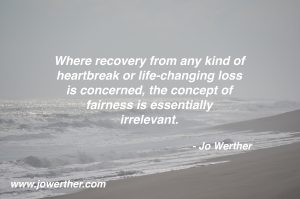Life isn’t fair.
Know the feeling? I think everybody does. And when you’ve suffered heartbreak as a result of one or more life-changing losses, there’s a good chance that your story about what happened (you know, the one you tell to your confidants) includes the notion that it wasn’t fair. Even if you keep it to yourself, the thing is that the whole idea of fairness tends to make people feel worse instead of better, especially when they’ve suffered some kind of heartbreak or life-changing loss.
The concept of “fairness” is a mixed bag.
If you’re getting support from sympathetic friends who agree that whatever happened in your life wasn’t fair, it can feel helpful. But if telling yourself it wasn’t fair fuels the fire of your feelings of anger, sadness, blame or regret, and overall misery, then it’s doing you more harm than good. In either case, to be less at the mercy of the concept itself, you’ve got to raise your awareness about your own beliefs and feelings about it.
Where did your ideas about fairness come from?
The concept of “fairness” is a sticky wicket. It’s relational and situational; it’s religious and historical; it’s legal and ethical. And it tends to bring up a lot of emotion for most people. It’s perfectly fine to believe whatever you do believe about it, with one catch: your beliefs about fairness will have direct bearing on your ability to recover and get back on your feet after having the rug pulled out from under you.
Here’s the link to my podcast about fairness. In it, i will:
- Propose a new way to think about the concept of fairness that will ease your emotional misery and increase your serenity.
- Show you the powerful connection between the concept of fairness and Acceptance, Deep and Complete.
- Give you a simple practice to help you clarify your own beliefs about fairness and decide whether they are helping or hindering your efforts to restore your emotional well-being.
Click below to listen to this episode:

This is awesome and really helped me!